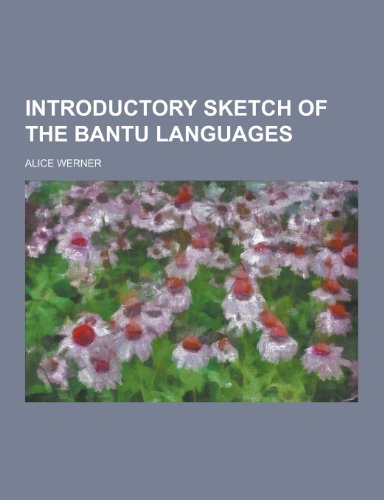
| Title | : | Introductory Sketch of the Bantu Languages |
| Author | : | |
| Rating | : | |
| ISBN | : | 1230265090 |
| ISBN-10 | : | 9781230265094 |
| Language | : | English |
| Format Type | : | Paperback |
| Number of Pages | : | 76 |
| Publication | : | First published September 12, 2013 |
This historic book may have numerous typos and missing text. Purchasers can usually download a free scanned copy of the original book (without typos) from the publisher. Not indexed. Not illustrated. 1919 edition. ... mwivhu, but the sound--see p. 7 of his Grammar--is clearly that of ' bilabial v.' 8 We should have expected kumbadi hwa menxhi, mbadi 9 being placed in CI. 17 by prefixing the locative ku, but see Smith, p. 223. Mbadi is not given in the vocabulary as a. noun, but cf. Nyanja mbali 9 ' edge, side, rim;' no doubt the same word used in Swahili as an adverb ' far,' etc. 10 tia ' be afraid ' (cf. Swahili tisha 'frighten '--probably a causative of the verb usually written cha ' fear '), and so 'run away ': tiana reciprocal, but apparently with the meaning 'run against' (or, ' in competition with') and not 'run away from' each other. 11 Present Subjunctive, used in place of Imperative. u Nguni, interrogative (Smith, p. 101), 'it is who?' A relative is understood after it, or rather, it is an example of a construction very common in the Bantu languages, even where relative pronouns the demonstrative, or even the ordinary personal pronoun are often preferred, as though it were less trouble to make a fresh assertion than to link up the clause with the preceding one. 13 Second. Future (Smith, p. 157)--probably distinguished from the Preterite by tone.--languna, evidently a derived form of tanga 'begin,' but the force of the termination is not very it can scarcely be reversive (Smith, p. 130). 14 Dimwi ' another' (agreeing with izuba 5 'day,' or some similar noun, understood), and preceded by the instrumental preposition 0 (Smith, p. 224), so meaning ' again.' 15 Same tense as in line 4--see above, note 7. 16 Obashanasulwc, a kind of collective pl., including the person named and those with him--see above, p. 48, and Smith, p. 18. This, or a similar idiom seems to be universal in Bantu--e.g. nge Bandega, ' ce sont des...





